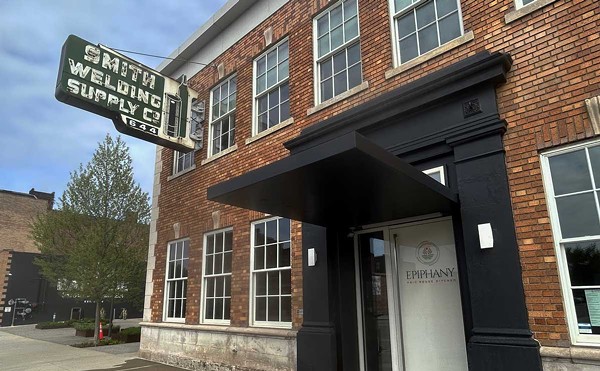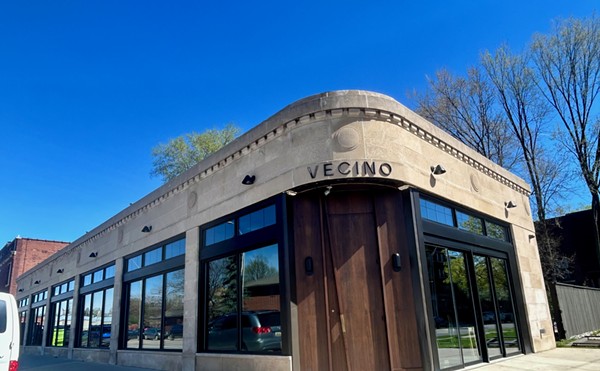It’s 8:30 a.m. and Avalon International Breads in Detroit’s Cass Corridor is a beehive of activity. A perpetual line forms behind a glass counter showcasing piles of organic rolls, cookies and focaccia pizzas. The scent of hot coffee and fresh bread fills the air. Behind stacks of crusty loaves, workers roll dough, plop fresh Michigan jams onto sticky pastries and tuck sprouts into sandwiches.
Neil Young’s sweet ballads lilt overhead. Bakers joke and laugh and look altogether too relaxed to be working.
In the rear of the bakery, co-owner Ann Perrault watches yeast bubble and rise. The fermenting flour and water — called “mother” or “starter” in the bread world — must be fed water and flour three times a day. Perrault uses her strong arms to hand-stir the mother, swirling it around in a big bucket with her gloved hands.
As the sticky goo feeds on itself, it will double in volume in 24 hours. It’s combined with other ingredients and baked into bread in Avalon’s 10,000-pound steam-injected oven. Then, the process starts all over again.
Perrault’s been up since dawn to supervise the arduous craft of Old World bread making. As she dumps huge bags of flour, water and salt into a 260 pound-capacity Italian dough mixer, she explains the rigors of producing 475 loaves of breads and baguettes most days — 2,000 loaves on Fridays and Saturdays.
“It’s a pretty high-maintenance thing,” says Perrault. “You have to keep on it.”
Up front, an elderly, bearded man in tattered clothes walks in. He retrieves his daily cup of coffee, then grunts at an employee who is chatting with a friend: “You can’t be up here, beautiful young lady. You’re supposed to be behind the counter, working.”
He shoots her a grin before hobbling away. “I love that guy,” says employee Amy Bogl. “He comes in here every day.”
Diamond in the rough
Avalon is at 422 W. Willis, nestled in the heart of the Cass Corridor, where prostitutes, drug dealers and panhandlers roam among denizens of the night and the university students, artists and professors of the day. Owned by Perrault and her life partner, Jackie Victor, the bakery has become a Detroit success story and beloved urban enterprise — despite the owners’ insistence on doing absolutely everything the hard way.
In a city where gourmet foods and good atmosphere are hard to find, Avalon provides a mecca for the Detroit gastronome. In its sixth year, Avalon bustles nearly all the time — it’s a place to see and be seen. You’re just as likely to spot anarchists and hippies as yuppies, soccer moms and professionals.
And the area is getting more popular by the minute, aiding the bakery’s success.
“The idea was to create an oasis from urban and modern culture,” says Victor.
The bakery’s wholesale customers include the Whitney, Holiday Market, Nino Salvaggio and the Palm.
Selling bread retail for $2.50-$5 a loaf, the bakery draws many customers from the surrounding low-income neighborhood.
Others come from as far as Plymouth to get a daily fix. Many speak of the bakery in reverent tones, as if nirvana resides in its creations of dough.
“I can hardly remember life before Avalon,” says Elena Herrada, a resident of Corktown who works in Southfield. “Ann and Jackie, all the Avalon family, are absolute concrete proof that a local business can flourish in the heart of the city; that people can eat healthy food in the inner-city neighborhoods; that we can become self-reliant without chain stores and corporations, if we choose to.”
The Zen of bread
Bread is only a slice of what Perrault and Victor wish to provide. More than anything, they want to create an urban renaissance and set an example for sustainable, Earth-friendly businesses. They’re dedicated to staying small, direly opposed to franchising.
“Why would we rob someone else of the joy of starting a small business?” says Victor with incredulity.
The bakery has a national reputation as an example of a sustainable business, done the Buddhist way. The concept is codified in the book Building a Business the Zen Way, written by Geri Larkin, a Zen priest and former corporate-management consultant. Larkin dedicated her book to Perrault and Victor, stating that the pair “continue to cultivate new ground in this spiritual-work-meets-financial-success realm.”
Before opening Avalon, Perrault and Victor took classes in Ann Arbor from Larkin, who coached them through the first year of business. Larkin’s theory teaches entrepreneurs to integrate business priorities with personal, spiritual, community and environmental values.
For instance, the bakery closes on Sundays, even though it could ring up sales, so Victor and Perrault can have a day of rest.
For five years, the bakery closed for one week in August so the owners could vacation. Each of those years, the bakery lost a major wholesale customer during that week, but the owners were undeterred.
“If we can’t get exercise, cook decent meals and spend time with our loved ones and friends, then why are we doing this anyway?” asks Victor.
This year, the bakery is at full staff, with 25 employees, so the closure wasn’t necessary, she says.
“They’re training to be a sustainable role model,” says Catherine Greener, a business consultant for the Rocky Mountain Institute in Colorado, a firm that helps businesses become environmentally and socially sustainable, yet profitable. “I think they are a model not only for Detroit, but for small businesses nationwide. They’ve had rapid growth, and sustainable growth.”
Victor and Perrault say their philosophy of Zen business requires:
• A socially responsible operation, with the right relationship to the Earth. That means buying expensive organic flour. “If the flour goes to $100 per pound, we’ll charge $50 for a loaf of bread,” says Victor. “That’s the bottom line.” The bakery recycles as much as possible in a city that makes recycling difficult. It pays a staffer to oversee the process. “I would like to see us get to zero waste,” says Victor. “Right now, we’re nowhere close. But we’re working on it.”
• The right relationship with employees. Nearly all of the bakery’s staff lives in Detroit; 50 percent live in the neighborhood. Nearly half the staff is minority. Managing personnel, says Victor, is a constant challenge. “We call that spiritual boot camp. For any number of reasons, that has been the hardest. Socially, culturally, racially, education-wise, class, gender orientation, everyone comes to this very small space with different backgrounds. We love the diversity of our staff. We try to have an equation that works for everyone, and it’s very hard. There aren’t a ton of great leaders with greatly managed small businesses for us to follow.” When the bakery got faxes from the Detroit Chamber of Commerce lobbying against Detroit’s living-wage ordinance, Avalon quit the organization. “If you can’t pay people $7.25 an hour, what are you?” Victor says.
The bakery pays average wages of $9 an hour, she says. In addition to providing health care for full-time employees, the bakery will pay medical bills for part-timers in some cases. Avalon pays 50 percent for employees who get massage therapy, shares profits with employees twice a year, and is liberal with vacation time.
• The right relationship with the community. “If you’re the CEO of GM or a homeless person, as long as you are respectful, you will be treated with respect here,” says Victor.
Leftovers are sent to food banks and charities. Victor and Perrault are involved in local politics, helping lead a campaign to shut down Detroit’s municipal trash incinerator.
“We want to provide something of use. Bread has always been a cornerstone of health, sustenance and, sometimes, revolution,” says Victor.
Despite these lofty, costly goals, the bakery has been a business success. Avalon started turning a profit its first year, and paid off $150,000 in business loans last year. Each year, the business has grown by at least 20 percent, grossing nearly $1 million in sales last year, says Victor.
Victor and Perrault take modest salaries for themselves. And they’re happy.
“This is our passion,” says Victor. “We wouldn’t be doing this if we didn’t believe in it. If we wanted to make more money, there are a ton of things we could do and change to accomplish that. But that’s not our goal.
“We didn’t go into this to get rich. We did go in to make a good livelihood. We’ve always paid ourselves, except for a couple of times. We’ve always met payroll, paid our bills and our taxes. We’ve always just gotten by.”
Perrault adds: “In a lot of ways, the bakery is a way to do your everyday life that is beyond yourself. And it’s happy. It’s a happy place to be. And that’s good.”
Dedicated to Detroit
Steven Price delicately lays sliced zucchini on a focaccia pizza. Though trained at a restaurant in Grosse Pointe Park, Price’s last job was at Popeye’s Chicken. He lives around the corner from Avalon and is happy to have his job. “A lot of my input was taken in the production of new savory items,” says Price, 34. “That’s really good.”
At the “bench,” as it’s called in the bakery, Richard Watson, 21, and Rasheida McElvene, 27, are cutting and rolling dough. Watson says Avalon was his first Detroit job.
“Before that, I had a hard time getting a job in the city. I would mainly get jobs in the suburbs. If I could find a job here, it was one I didn’t really want. You know, Church’s Chicken or something.”
Watson, son of a firefighter, feels fortunate. His friends, many laid off from factories, languish without jobs. The only businesses in his west side neighborhood are liquor stores, fast food restaurants and coney islands, he says.
“Here, you can feed people, make bread — it’s an honest living. You’re not going to kill anyone or steer them down the wrong track. I can sleep well at night working here, knowing some kids have some good bread.”
Perrault and Victor intended to create jobs and quality work in Detroit, and wish more people would do the same.
Though neither was raised in the city — Perrault is from Downriver, Victor from the northern suburbs — each “had from a very young age an abiding interest in the revival of the city,” says Victor. Perrault has been here since 1980; Victor, since 1990.
The couple met in 1991. Perrault was a leader in the local gay and lesbian community, having founded the Detroit Women’s Coffee House at the Unitarian-Universalist Church; Victor was working with an anti-nuclear arms group.
They have a 2-year-old daughter, Rafaella. Victor, who was artificially inseminated at a fertility clinic, says during and after her pregnancy, customers have been incredibly supportive and always ask about Rafaella, whose pictures are on display.
“Luckily, we don’t have gay stalkers here,” says Perrault, though she notes drunks have called her “dyke.”
“But that really never happens,” says Victor. “People who were uncomfortable, they either got comfortable or stopped coming. Or they don’t know.”
The women were inspired to start their business by James and Grace Lee Boggs, Detroit political activists.
“They made me see that life was bigger than yourself,” says Perrault, “that things you do can make a difference 200 years from now. The personal became the political.”
Victor adds: “Jimmy used to say, you can’t rely on the big boys to supply our needs. If we want to see this city become a different city, we have to start today.”
In 1995, Perrault had been working for 12 years as a massage therapist for children with severe mental and physical handicaps. After 14 of the kids died in one year, she was ready for a break. The couple moved to the Traverse City area to stay with friends.
In 1996, Bob Pisor, an ex-Detroit TV newscaster who now runs Stone House Bread in Leland (near Traverse City), asked Perrault and Victor to help him. The two took on a grueling apprenticeship, saying they often baked from 1 a.m. to 10 p.m., during the summer of 1996. They met “bread head” Alan Maniscalco, who helped develop recipes for Avalon and get the bakery off the ground.
Back in Detroit, Perrault and Victor saw their current location was for rent.
“It was amazing, because Jackie had said 10 years ago that this would be a perfect place for a bakery,” says Perrault.
They had $150,000 for startup costs; having raised about $20,000 by selling bread coupons to family and friends, getting donations and two loans from Ann Arbor’s Zen Temple.
Zingerman’s, an Ann Arbor bakery, got a new oven and sold Perrault and Victor its older steam-powered mammoth for a bargain discount: $20,000. A new oven would have cost as much as $60,000.
Zingerman’s also donated its original business plan to Perrault and Victor.
“Even though we could be considered competition, they have been very generous and helpful,” says Victor.
“Almost like mentors,” adds Perrault. “Things just fell into place.”
Sparking change
The Cass Corridor Food Co-Op health-food store is credited as a pioneering retailer in the neighborhood. When Avalon opened in 1997, it brought new foot traffic. Since then, numerous businesses have popped up.
Jambolayah Creative Co-op, a clothing and accessory store, opened in Avalon’s strip two years ago. Now that the food co-op has relocated to Charlotte Street, the Spiral Collective — a combination of the Del Pryor art gallery, a bookstore, a hair salon and a beauty products shop — is assuming the co-op’s space. A coffee and sandwich shop is opening right next door.
“I have watched the evolution of this block for a number of years,” says Nefertiti, who will be a hair stylist at the Spiral Collective. “This was a hole in the wall. I’d come by here and watch Ann work in here with her own hands. I knew it was someplace I wanted to be. Jackie and Ann have had a lot to do with it. Now, we all complement each other. We all work together. It’s a harmonious flow.”
Victor wanted Avalon to help spark a renaissance in the corridor. It has, to some degree. But movement is slow. Rents are high; city incentives for small entrepreneurs are nearly nonexistent. Spaces haven’t been renovated in 15 years, which makes them expensive to build out.
The bakery sits in a federal Empowerment Zone, created by the Clinton administration to provide business incentives in urban core areas. But Perrault and Victor say the zone is a sham, a mechanism for big business to get tax breaks. The only benefit the zone provides Avalon is a $2,000 a year tax break per employee who lives in the zone; but only two staffers do. “Nobody, or hardly anyone, lives in the Empowerment Zone,” says Perrault.
Yet, despite paying a 30 percent tax rate when income, sales, equipment and other taxes are added together, Avalon is succeeding.
“The key to the success of our city are these independently owned businesses,” says Kate Beebe, president of the Greater Downtown Partnership. “We need to get more businesses like that to locate here.”
Beebe says she and many of her associates go out of their way to patronize Avalon.
“Their product is really special. They’re the type of business that makes for a healthy neighborhood. They’re independent, they’ve got a good product that serves the adjacent residential community and it’s a destination product that people seek out. They’ve got it all.”
Allen Schaerges, who’s lived in the neighborhood for 30 years, says “the girls are still walking the streets, and the guys are still begging. But the bakery’s bringing more people down. It’s a little here, a little there.”
Despite the city’s physical blight, Victor says she believes the residents are magic.
“I really think that,” she says. “I think there are a lot of visionary people, a lot of idealists. The post-industrial carnage around us, what the car has done, what industry has done — we have an opportunity to make a difference. You almost have to ignore the mainstream, ignore City Hall, ignore the casinos, because they aren’t going to do it. We have to do it.
“We have an opportunity to form and create new institutions in the city. You can make a difference here.”
Lisa M. Collins is a Metro Times staff writer. E-mail [email protected]




